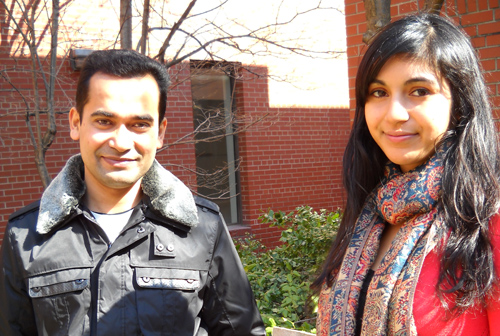
Something besides the birds is twittering in farm fields these days. Those growers might be “tweeting” customers about produce ready for picking. Or maybe their neighbours are alerting other farmers about a pest infestation through Twitter, Facebook or their blog.
Social media is coming to the farm – although it could be arriving faster and more often, especially to boost farmers’ fortunes in developing nations, says Ataharul Chowdhury. Newly arrived in U of G’s Ontario Agricultural College (OAC), he will use a two-year, $814,000 post-doctoral research fellowship from the Social Sciences and Humanities Research Council (SSHRC) to study social media and agri-food innovation.
He hopes to find ways to help farmers and producers use social media – including Facebook, blogs and online professional networks such as LinkedIn – to grow business in developing nations, including his homeland of Bangladesh.
This project brings together agricultural and social sciences – an unusual combination, says Prof. Helen Hambly, School of Environmental Design and Rural Development. “Most of our post-docs are typically from the Natural Sciences and Engineering Research Council, so this fellowship is an important recognition of our social science research within OAC.”
Social media has become second nature for such sectors as finance or tourism, says Chowdhury. In many parts of the world, he says, farming and food have been slower to adopt these technologies for sharing ideas and information. And few researchers have looked at the use of social media in agri-food for sharing information among growers, producers, processors and consumers.
He hopes to gauge its use and impact by surveying producers, groups and governments, particularly in this province. “I want to see what happens in Ontario in social media activities,” says Chowdhury. He points to examples such as an Ontario blog about ethnocultural vegetables. “And I want to measure the impacts on behavioural change of using social media.”
He will work with Farah Ahmed, a third-year student in international development. “Social media is becoming increasingly important,” says Ahmed, who hopes to apply her studies to rural development.
The researchers may find plenty of study fodder close to home, says Bronwynne Wilton, knowledge mobilization program manager in U of G’s Office of Research. Referring to such organizations as the Ontario Federation of Agriculture, she says, “Commodity groups are embracing social media.”
More individual farmers are developing social media smarts, such as a market gardener who tweets customers when fruit is ready for picking.
She points to the Farm and Food Care Twitter feed, tweets from farm writers and Foodland Ontario’s use of Facebook. Staff members at the Ontario Ministry of Agriculture, Food and Rural Affairs write blogs about tomatoes and farm pests.
Five years ago, a farmer might have mailed an insect’s photo to a pest diagnostic clinic and waited for the verdict while an infestation continued to ravage his crops and those of his neighbours. Now a tweet can circulate to hundreds of people and an answer about spraying might arrive in minutes. Says Wilton: “There’s an opportunity for information to be disseminated quickly and cheaply.”
International examples of social media exist, including blogs and YouTube videos about topics such as e-agriculture and safe drinking water. But Chowdhury says many farmers in developing nations lack access to information technology to, for example, find new seed sources or obtain banking and financing data.
Consumers might benefit as well, he says, by learning about food safety issues or tracking down particular foods. That’s where the researcher becomes the consumer.
Chowdhury arrived in Canada last year as a new immigrant. Finding tastes of his homeland is a challenge in ordinary grocery stores, although he has tracked down a few Southeast Asian flavours in Guelph specialty outlets.
He’s also interested in FarmStart, an incubator program for new farmers, including immigrants. He says would-be immigrant farmers often lack information about small-scale production in their new home. Social media might help them connect to share ideas and learn about organizations such as FarmStart.
After studies in Bangladesh, Chowdhury completed a second master’s degree at Wageningen University in the Netherlands. He arrived in Canada following a PhD at the Vienna University of Natural Resources and Life Sciences. “Canada is one of the best countries doing a lot of international development,” he says.
While in Vienna, he had connected with Hambly through a colleague at the Africa Rice Centre. Based respectively in Austria and Guelph, they co-wrote a paper on participatory video that was named as the best article for 2010 in the Journal of Agricultural Education and Extension.
Hambly says the SSHRC award will “bring an expert in the field of participatory communication and social media for agricultural extension to our program in capacity development and extension. This is a relevant area of research around the world, including in rural Canada as Internet connectivity expands and agri-food knowledge systems increasingly digitize and operate within virtual spaces.”